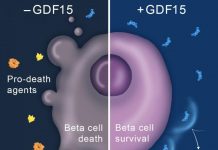April 2006 - A major finding, which represents an important step toward a potential cure for type 1 (insulin-dependent) diabetes, has been made by a research team at the La Jolla Institute for Allergy & Immunology (LIAI). The team, led by Matthias von Herrath, M.D., an internationally recognized expert on the molecular basis of type 1 diabetes, used a combinatorial treatment approach in laboratory mice and found it reversed recent onset type 1 diabetes in the majority of animals tested.
The study, which combined two therapies (anti-CD3 antibody and proinsulin peptide) already being tested individually in human clinical trials, produced better efficacy, longer-lasting results and fewer side effects in the preclinical trials in mice than either therapy has shown alone in the human studies. The researchers hope to begin testing the combination therapy in human clinical trials later this year. Damien Bresson, a researcher in Dr. von Herrath's lab, contributed to the study. Kevan Herold, an Associate professor at Columbia University, and Jeffrey Bluestone, Director of the University of California, San Francisco Diabetes Center, were also contributors.
"The finding of increased efficacy of reversal of recent-onset type 1 diabetes in animals that received a combination of systemic anti-CD3 antibody and intranasal proinsulin peptide compared to therapy with the antibody alone is an exciting and important finding," said Richard A. Insel, M.D., Executive Vice President for Research at the Juvenile Diabetes Research Foundation.
The anti-CD3 antibody has been shown to temporarily reverse recent onset human type 1 diabetes in two independent clinical trials. The reversal was maintained for more than a year. "This combination approach is worth evaluating in human type 1 diabetes to increase both the overall efficacy of the treatment and the duration of the beneficial effect," Dr. Insel said.
The finding was published in the online version of the Journal of Clinical Investigation in a paper, "A novel combination therapy in recent onset autoimmune diabetes: synergy of anti-CD3 and nasal proinsulin to induce Tregs." Dr. von Herrath said the human clinical trials, which still require regulatory approval, would be directed at persons recently diagnosed with type 1 diabetes or who are already being treated for pre-diabetes.
Continue Reading Below ↓↓↓
George Eisenbarth, M.D., Ph.D., Executive Director of the Barbara Davis Center for Childhood Diabetes in Colorado, called the finding "a very important discovery, demonstrating synergistic efficacy of two therapies (anti-CD3 and proinsulin immunomodulation) that are in human studies for the prevention of type 1 diabetes."
Dr. von Herrath's approach focuses on teaching the immune system to tolerate, rather than attack, the insulin-producing beta cells of the pancreas. By injecting the anti-CD3 antibody, which calms the immune system and lessens the attack on the beta cells, along with a piece of the nasal proinsulin peptide, which acts like a vaccine and induces a special cell type called "regulatory cells" that can actively and highly specifically protect beta cells, Dr. von Herrath was able to stop the immune system's destruction of the beta cells in mice.
Combining the two therapies produced a "strong synergy," he said. "The combinatorial approach doubled the efficacy in laboratory mice -- with fewer side effects than using either one alone." The study represented the first time a combinatorial treatment approach using a vaccine strategy had ever been tried in type 1 diabetes. Dr. von Herrath added that the combined therapy also showed long-lasting results. "The diabetes never reoccurred in the lifespan of the mice."
Mitchell Kronenberg, Ph.D, LIAI President and Scientific Director, said the therapy is "particularly attractive because � if successful in humans � it could replace current insulin-injection treatments altogether, which often cannot prevent the long-term detrimental effects of diabetes." Type 1 diabetes, also called insulin-dependent diabetes or juvenile diabetes, occurs when the immune system mistakenly destroys the insulin-producing beta cells of the pancreas, which are key to controlling blood sugar levels. As a result, type 1 diabetes sufferers inject insulin daily to control blood sugar levels. However, complete control is difficult to achieve and damage to body organ systems can still occur. Complications from type 1 diabetes can include kidney failure, adult blindness and the need for amputations.
"Since the complications from high blood sugar levels (diabetes) worsen with time, we are hopeful that this therapy can reverse the disease in patients before they have too much multi-organ damage," Dr. von Herrath said.
Source: La Jolla Institute for Allergy and Immunology









